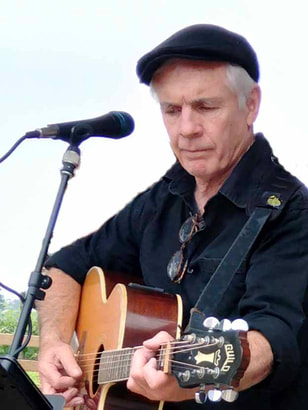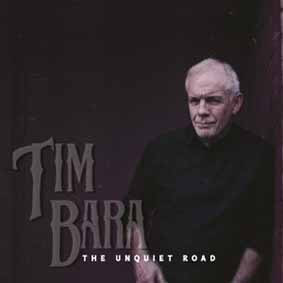 The songs are still sad but this time round Tim O’Brien is enjoying them a whole lot more.
The songs are still sad but this time round Tim O’Brien is enjoying them a whole lot more. I HAD time to play Tim O’Brien’s new album The Unquiet Road twice as I drove to Cranbourne. In the Australian folk/country tradition, they are songs of love and loss and longing. He sings about the rural diaspora, about homelessness, about farmer suicide and urban disconnection but also about enduring love. Tim's probably the only person who could turn Coolangatta into a song full of regret.
By the time I reached the station, I was very melancholy. We all have towns we left behind, roads we didn’t take, and other roads we probably shouldn’t have. All day I was slightly ethereal, in a good way.
Tim describes himself as "quite a cheerful sort of bloke" but admits to being drawn to melancholy and nostalgia. "It’s the Irish in me. It was quite deliberate to call the album The Unquiet Road. All those things that never leave us. It’s a bit of a life opus. Our lives are full of sliding door moments.”
“When I go back there everything is visually the same. The same hills, the same houses –but everything is subtly different because the community that made up of all those small farms and families is gone. Everything has changed.
“I often think about the remote childhood I had. I wonder about the influences that I didn’t recognise at the time.”
They included a rich musical heritage from both his parents, third generation Irish Celtic. His mother was a talented violinist and pianist. “I grew up singing, we always sang. Music was simply part of us, of how we thought about ourselves and a rich embedded part of our lives. For every family gathering the piano would be pounded mercilessly into the night.”
Apart from the Irish Celtic influence, he discovered the poetry of Dylan and Cohen. He learned from the verbal economy in Paul Simon and Carole King and loved the tearaway Irish musicianship of Planxty and Paul Brady. Ralph McTell was another influence. All of them told stories in song.
| I met Tim through the campaign to save the Western Port Woodlands. When he said he was going to write a song for the campaign I didn’t think much of it. A few weeks later, at a crowded public meeting in the Corinella Hall, he first sang On a Grantville Shore. The room went quiet. It was stirring and unexpectedly moving. Clearly this was someone who knew what he was doing. When I confronted Tim about it, he admitted he’d been a folk singer in a previous life. He’d even had a hit. “Just a small one,” he said. His album Melbourne Town was a best seller for about seven weeks – unusual for a folk album in Australia. It gave him entrée to the festival circuit and he played as support act for some names, including Redgum, Eric Bogle and Pam Ayres. But he had a bit of what we would now call imposter syndrome. “I wasn’t much of a guitarist, I wasn’t much of a singer and I didn’t think I was much of a songwriter. I’d go to these concerts and I was worried about my own skills.” | Second time round in Tim’s musical career there is another and famous Tim O’Brien on the world country folk stage. So the name on the CD cover is not Tim O’Brien but Tim Bara. The Unquiet Road is available from Newmarket Music and Soundcloud. |
He became a freelance writer. Out of one insecure career straight into another. He wrote educational works, including an award-winning children’s book, The Penguin Shore, and musical plays and stories. Later he became a motoring journalist and magazine editor, then took a U-turn, writing A Handbook of Workplace Mental Health.
He didn’t give up music entirely – in 1999 he picked up a CMAA Golden Guitar nomination for his song about the rural diaspora, The City Drift – but for 25 years he barely picked up a guitar.
All along, however, he felt he had unfinished business with music. “It’s never left me. I was constantly thinking about it, nurdling around with words. I was also realising that I was running out of time. If I was ever going to do it I’d better do it now.”
And so his second album has appeared, more than 30 years after the first.
Living on Phillip Island, he is surrounded by talented musicians and he has pulled them in to make this album musically rich: producer and audio engineer Andy Stewart of The Mill Studio, which Tim describes as “Bass Coast’s Muscle Shoals”; AJ Leonard on strings and piano, Jenny Rowlands on cello, Col Matthews on guitar, Dean Roberts on piano and guitar and Dayna Roberts on fiddle.
This time around, there’s no pressure to create a career out of music and he has enjoyed the process a lot more. “I’ve really enjoyed the discipline of trying to shape the work, of coming up with an album, of working with Andy and the others.
“I’m just so pleased to be making music again. I feel that something inside has woken up after a very long sleep.”
